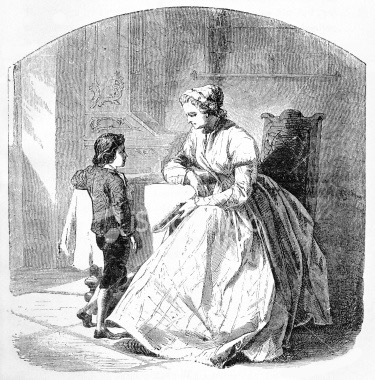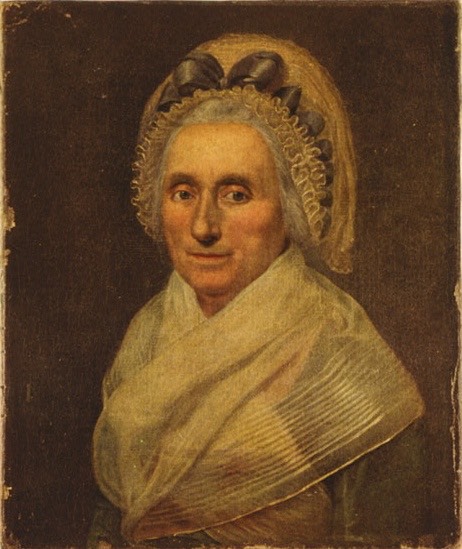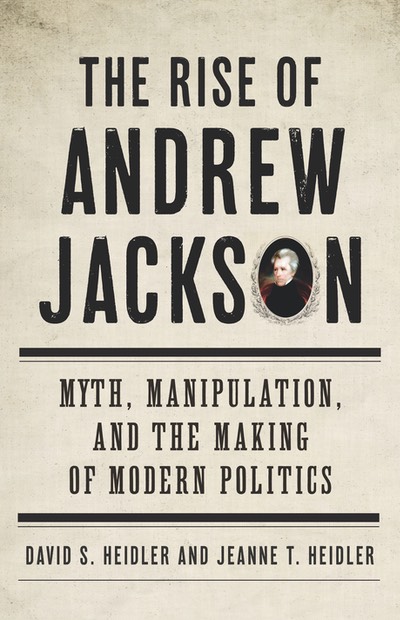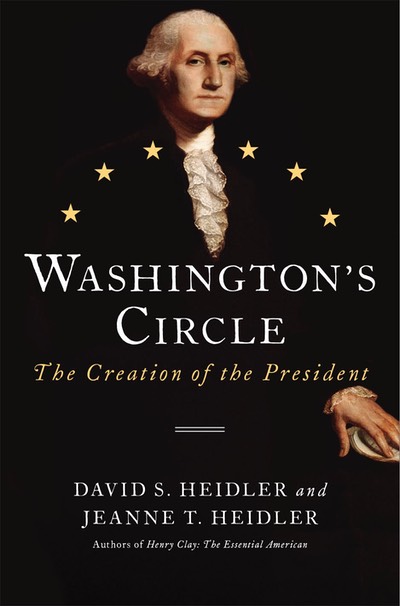She walked a long, lonely path.
When Mary Ball Washington is recalled at all, it is only as George Washington’s mother. For many years depictions of her apart from her famous son resorted to the fanciful. She was a gray-haired matriarch, pious, gentle, and loving, but tough and independent. Such treatments embellished motherhood with a Victorian recipe for reverence and a dash of vinegar for seasoning. Consequently, the nineteenth-century chroniclers merely made Mary Ball another Washington myth, like her famous son’s chopping down the cherry tree and not lying about it. The reality about Mary Ball is simpler, and even straining toward fairness, less flattering. Until we take a second look.

Nineteenth century depictions of mother and son were fanciful because little is known about George Washington’s childhood and the mother who shaped it.
She was Augustine Washington's second wife. Jane Butler Washington died in 1730, likely from complications in childbirth, and left Gus Washington a widower with an eight-year-old daughter in addition to two sons he was having educated in England. He probably married Mary Ball only to provide his little girl a mother.
Mary was twenty-two when Gus came courting, which made her an old bride for the time. But she made up for a late start by beating the actuarial odds of eighteenth century Virginia by a long mile. She also produced Gus's second and larger family, beginning with a strapping baby named George in 1732 and following with five more children — three boys and two girls — over the next seven years. This second family was a healthy brood. Although the youngest girl died in infancy, the rest saw America gain independence, and two of them would live to see their oldest brother become the country’s first president.
Mary Ball knew hardship early and often, which might explain why she later became hardbitten. Born in 1708 in Lively, a village in Virginia’s Lancaster County, Mary was only three when her father died and only twelve when her mother followed him. A local lawyer named George Eskridge became guardian to the twelve-year-old orphan to raise her at his spacious house at Sandy Point, a kindness she remembered by choosing Eskridge’s Christian name for her firstborn.
She and Gus lived at Pope’s Creek, and it was there that George, Elizabeth (always Betty), and Samuel were born. In 1735 when George was three years old, Augustine moved the family to Little Hunting Creek, which he had purchased from his sister nine years earlier. It was called Epsewasson at the time, after a small Potomac tributary that bordered it. Years later the place became Mount Vernon.
Augustine Washington was in his prime when he became ill and died in April 1743 leaving Mary with five young children. The second Mrs. Washington never remarried. With the help of overseers, she maintained the Washington farms on the Rappahannock, and she saw to the fulfillment of the complicated terms of the will in which her husband provided for his first and second families.
That we know so little of George Washington’s childhood is a testament to her prudence and measured stewardship. Nothing remarkable during those years intrudes on his story. Because George’s early years are unknown, his earliest biographers invented stories to reveal a noble character fully formed and portending a great man in the making. The fable of his father’s cherry tree was part of that, as were descriptions of him as wise beyond his years, devoted to his widowed mother, and steadily grooming himself for grave responsibilities.
True enough, Mary Ball Washington shaped the boy's childhood, though it’s hard to say how. Her influence could have been profound, but we must mainly infer it. On at least one occasion, she halted George's impulsive plan to join the Royal Navy, enlisting her brother Joseph to describe life at sea as worse than brutish and likely to be short.
Other than that we are left with contemporary descriptions of Mary Ball Washington as imperious, and that label is from her kindest critics. The less charitable described her as chronically unpleasant. This could be unfair given her youthful misfortune and the demands that loomed in the years following her husband’s death. Mary Ball stood at the head of a young family when Augustine died in 1743, and she had to balance her obligations to her children against commitments to the adult boys from her husband’s first marriage. The very roof over her head at the Rappahannock River property was never hers. She held it in trust for George, who was supposed to take title in 1748. It could not have been easy.
Washington by word and deed loved his mother from filial duty, which is to say he loved her because he was supposed to, but he did not like her. A hasty judgment against him for this is unfair. Her ways were demanding and her words sharp. She was difficult by habit and often groused about her lack of money and the shortcomings of her children. Possibly she was a meek and noble soul in Washington’s youth, but if so, she changed for the worse over the years. She never visited Mount Vernon during Washington’s marriage, and George Washington’s wife Martha seems to have met her only once.
In fact, Mary Ball’s last trip to Mount Vernon happened four years before her son’s marriage, and it was not social. She wanted to persuade him not to accompany a British military expedition into the western country. It was a habit she indulged during wars, and apparently one not prompted by concerns for Washington’s safety. Instead, she reminded him that his first obligation was to her, and her behavior in these instances especially nettled him. In 1755, he wrote one of his letters of reprimand declaring that he would, by God, answer the call of duty and adding as a finality, “it would reflect dishonor upon me to refuse.”
Washington’s sister Betty was a saint in this awkward family association. Washington allowed his mother to remain at the Rappahannock River property far beyond the five years allotted her in Augustine’s will, but she finally turned it over to him in 1771. Washington bought her a home in Fredericksburg the following year so she could be close to Betty, whose husband Fielding Lewis was then building a large house on his plantation just outside town. Interestingly, when the spacious Lewis mansion was completed in 1775, Mary Ball did not move in with her daughter and son-in-law, suggesting that there were limits even to Betty’s saintliness.
Though Mary often visited the Lewises and Betty became the old woman’s companion and caretaker during Mary’s long, long dotage, it was never quite enough, much to everyone’s exasperation. No matter how much the children gave her, Mary always complained that she was ignored, and during the Revolution she finally crossed a line. Citing Washington’s service — about which she was usually dismissive — she petitioned the Virginia Assembly for a pension. Carping about finances to the family was one thing; humiliating the family with claims about their indifference and her penury was quite another. Washington was never angrier with her.
He got past it, but their arm’s-length relationship never changed. When Washington’s brother Jack died in early 1787, Mary Ball renewed her complaints about poverty and neglect, and in February, George Washington sent her a stern note with £15, money he said he could barely spare. He had not yet paid his taxes from the previous year, he muttered, before launching into a recitation of why she should live with one of her children, but not with him. “My house is at your service,” he said tersely, and the narrowly disguised insincerity of that opening was unmasked by his adding in the same breath, “I am sure, and candor requires me to say, it will never answer your purposes in any shape whatsoever.”
Reflection tempered his mood as the old filial duty reasserted itself. A few weeks after writing this letter, he visited her in Fredericksburg and found her feeling poorly, but she was an old woman and complained from habit. Nothing extraordinary seemed to be ailing her. He visited again in the summer of 1788, and traveled to her home the following spring as part of tidying his affairs in preparation for assuming the presidency. By then, though, Mary Ball’s complaints about ill health were not empty grumbling. She had breast cancer.
There was nothing anyone could have done. Dr. Elisha Hall attended her and dismissed the herbal remedies then in vogue as nothing more than witchcraft. Washington readied himself for his journey to New York City, but he did so with the strong suspicion that his mother was dying.

Mary Ball Washington in the last years of her long life
But something remarkable had happened. As she became ill with cancer, Mary Ball Washington tapped into previously hidden reserves of affection for her son, particularly when he became ill before leaving for New York and the presidency. She began saying things more tenderly than she had in years. She frequently asked about him without asking for anything for herself, and she worried about him with selfless devotion. At the end of their last visit, he mounted his horse to ride away, sure only in the knowledge that life was fragile. But for the first time in years, he could believe that his mother loved him.
That summer, the first of his presidency, Washington became seriously ill, and Betty wrote him that their mother had become fixated on his health. She would not believe he was recovering until she heard from him directly.
In her 81 years, Mary Ball Washington walked a long path made lonely at the start by circumstance, made difficult in the middle by chance, and finally made friendless at its end by the jagged edges of a personality shaped by hardship and herself, a hopeless prisoner of her past.
It could not have been easy to lose the people she counted on. She likely loved them but with the kind of reluctance to show it that lives in a wounded heart. Her parents died when she was a child, and her husband died when she was a young mother. Her children began to go to their graves too, but others weary of her hectoring and complaints simply went away. She judged them all to be indifferent, which wasn't fair to George and certainly not to Betty. She occasionally embarrassed them with public airings of private matters, which was both mortifying and infuriating. But along the way, she had kept them clothed, fed, healthy, and safe from the perils of a world whose cruelties she knew too well too early. That never changed for her along the long path from living in Lively to dying in Fredericksburg.
In August 1789, Mary Ball Washington suffered a stroke and slipped into a coma. She died on August 25 at 3:00 in the afternoon, the time always appointed for the main meal in her son’s household, sharp, and in New York, he was sitting down to it as she passed away. Betty would see to it that her mother was buried at her favorite spot on the Lewis plantation, a little clearing in a copse of trees where birds sang in dappled sunlight. And Betty would write to her brother a letter that came as no surprise but carried a small arrow of grief with a little basket of gratitude; a shared one for the food, the shelter, and the health all those years before, gifts from a wounded heart.



